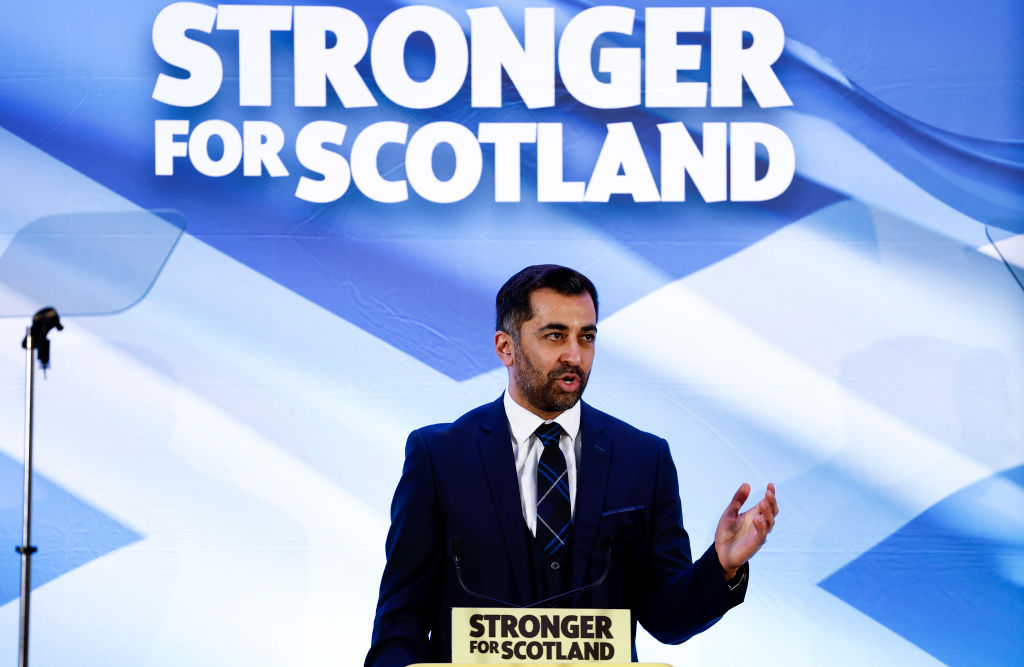If you just ignore the opinion polls, Humza Yousaf’s first 100 days as First Minister have been an unqualified disaster. Yousaf eked across the finishing line after an internal election drenched in ruthless skullduggery and bitter factionalism. In the aftermath, he alienated and exiled his party rivals and turned the SNP backbenches from a North Korean military parade into a Holyrood remake of House of Cards.
His deposit return scheme imploded and his proposed ban on fishing in 10 per cent of Scottish waters was sunk by public opposition. His government just announced that two vessels commissioned for the state-owned ferry company in 2015, and which have never been delivered, will now cost an extra £20 million, bringing the total bill (originally £97 million) to £351 million.
Westminster has refused to give him another independence referendum. The EU has knocked back his plans to appoint a Scottish envoy to Brussels. The Foreign Secretary has banned SNP ministers from meeting foreign officials without a UK civil servant present. Half a dozen of his MPs, including his deputy leader at Westminster, have announced they won’t be contesting the next general election.
Police are investigating his party’s financial affairs and have arrested and questioned former leader Nicola Sturgeon, her husband and former chief executive Peter Murrell, and former treasurer Colin Beattie. (All were subsequently released without charge.) The party’s headquarters have been raided, as has the home Sturgeon and Murrell share. A high-end camper van has been impounded.
He is, quite plainly, a dud
Yousaf has had the worst run of luck since Tsutomu Yamaguchi, a Japanese marine engineer who survived the Hiroshima bombing and went back to work three days later in Nagasaki – the day the second bomb was dropped there. However, more than rotten luck has been at play. Yousaf has shown himself to be a poor strategic thinker, an inartful communicator and a serial misreader of both the political and policy landscape. He is, quite plainly, a dud.
But those polls. They’re not great but they do not look like the polls of a man who has spent the last 100 days stepping, Sideshow Bob-like, onto every rake he could find. The SNP is still in the lead in Westminster voting intentions, although Labour appears to have narrowed the gap significantly. It’s much the same picture when voters are asked about the next Scottish parliament elections.
Now, I’m not casting doubt on the analysis that Labour is dramatically rebuilding its support in Scotland, as former Scottish party leader Kezia Dugdale has, but I am noting that, despite all that has happened in the last six months, the SNP is still commanding a third or more of Scottish votes. That’s not enough to stave off considerable losses come the general election, but it is much doughtier than the 24 per cent Scottish Labour crashed to in the 2015 general election or the 17.5 per cent recorded by the Tories in 1997.
There is still time and the Nationalists could fall further. The closer we get to the election, and if the polls continue to show Labour on course for victory, there is every chance that some Labour-to-SNP converts might break away and return to the red fold. Even if that does happen, it would be unwise to write the SNP off. They sustained heavy losses in 2017 only to recoup most of them two years later, though admittedly the political context is very different today.
If I were a betting man, I would put money on Labour taking a lead in the polls and more or less sustaining it into the 2024 election. As I’m not a betting man, though, I can’t help but observe the sheer suffocating certainty around the SNP’s demise and wonder if the party’s opponents are being a little too complacent.
For one, even a severe reversal at the general election would still leave them running the Scottish government. The SNP are basically an irrelevance at Westminster – come on, let’s not pretend otherwise – but at Holyrood they hold real power, rather a lot of it, and they don’t have to seek re-election there until 2026. That places the next Scottish parliament election perilously close to midterm point of either a Labour government or a surprise fifth term for the Tories. If voters in Scotland didn’t take to Prime Minister Starmer or despaired of another five years of the Conservatives, an opportunity could open up for an otherwise beleaguered SNP.
For another, just look at the polling on Scottish independence. There have been 15 polls on the question since Yousaf took over. True, only three have shown a majority for secession, but that just reflects a broader trend since Sturgeon’s final two years. What is striking is that the lowest Yes has gone in these polls is 45 per cent – the share of the vote it secured in the 2014 referendum. Again, maybe this will collapse but if it remains the case that almost half of Scots want independence, that will test a Labour government trying to navigate its devolutionist theology with the more practical matter of keeping the United Kingdom together.
These misgivings have been bothering me for some time. I wrote about them on Coffee House last month. They don’t amount to anything as contrarian as suggesting the SNP isn’t in serious trouble electorally, because it definitely is. But they niggle away at the back of my mind every time a Labour figure talks as though sweeping Scottish gains are locked in. At this stage, that kind of attitude is far too precipitous. Humza Yousaf’s first 100 days have been calamitous but he and his party aren’t out of the game yet. They’ve lost momentum but they haven’t yet lost the election.







Comments